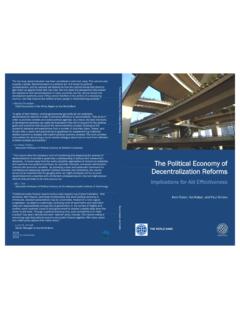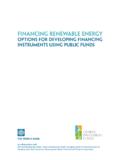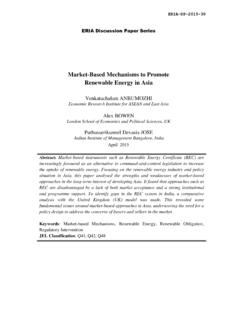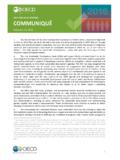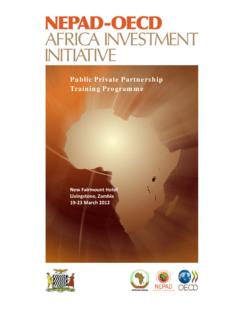Transcription of THE WORLD BANK
1 DIRECTIONS IN DEVELOPMENTDIRECTIONS IN DEVELOPMENTISBN 0-8213-5475-2 Lifelong Learning in the GlobalKnowledge EconomyChallenges for developing Countries xHSLIFELONG LEARNING IN THE GLOBAL KNOWLEDGE ECONOMYTHE WORLD BANKTHE WORLD bank In a static economy, what one learns as a youth will serve a a dynamic economy, learning needs to occur throughout one slifetime. Lifelong Learning in the Global Knowledge Economysets out the issues and makes a compelling case that educationalpriorities need to be refocused on lifelong learning , the book is a call to action for developing countries andthose who seek to help them. Barry R. Chiswick, DistinguishedProfessor, University of Illinois at Chicago Lifelong learning is a concept recently espoused by all internationalorganizations.
2 This book goes beyond the rhetoric of the conceptand addresses the practical issue of who will pay for it. As such, thebook is a timely addition. George Psacharopoulos, Member ofParliament, Hellenic Parliament, GreeceThe global knowledge economy is transforming the demands of thelabor market in economies worldwide. It is placing new demands oncitizens, who need more skills and knowledge to function in their day-to-day lives than can be acquired in formal educationsystems learning from early childhood to retirement is educationfor the knowledge economy, and it is as crucial in transition anddeveloping economies as it is in the developed WORLD . A roadmap for policymakers in developing countries to the keyissues and challenges of education in a knowledge economy, thisbook explores the ways in which lifelong learning systems encouragegrowth.
3 The authors discuss the changing nature of learning and theexpanding role of the private sector in education and training WORLD -wide. In a detailed and practical way, they consider the policy andfinancing options available to governments seeking to meet thelifelong needs of their WORLD BANKL ifelong Learning in theGlobal Knowledge Economy:Challenges for developing CountriesLifelong Learning in theGlobal Knowledge Economy:Challenges for developing CountriesAWorld bank ReportWashington, 2003 The International bank for Reconstruction and Development / The WORLD Bank1818 H Street, NWWashington, 20433 Telephone: 202-473-1000 Internet: : rights 2 3 4 05 04 03 The findings, interpretations, and conclusions expressed herein are those of theauthor(s) and do not necessarily reflect the views of the Board of Executive Directorsof the WORLD bank or the governments they WORLD bank does not guarantee the accuracy of the data included in this boundaries, colors, denominations, and other information shown on any map inthis work do not imply any judgment on the part of the WORLD bank concerning thelegal status of any territory or the endorsement or acceptance of such and PermissionsThe material in this work is copyrighted.
4 Copying and/or transmitting portions or allof this work without permission may be a violation of applicable law. The WORLD Bankencourages dissemination of its work and will normally grant permission permission to photocopy or reprint any part of this work, please send arequest with complete information to the Copyright Clearance Center, Inc., 222 Rosewood Drive, Danvers, MA 01923, USA, telephone 978-750-8400, fax 978-750-4470, other queries on rights and licenses, including subsidiary rights, should beaddressed to the Office of the Publisher, WORLD bank , 1818 H Street NW, Washington, 20433, USA, fax 202-522-2422, e-mail 0-8213-5475-2 Credit for cover photos: WORLD BankLibrary of Congress cataloging-in-publication data has been applied.
5 And Knowledge Economy and the Changing Needs of the Labor Market ..1 Implications of the Knowledge Economy for Education and Training ..3 Human Capital and Knowledge as Sources of Economic Growth ..4 The State of Education in developing Countries and Transition Demand for , Technology, and Education ..14 Employer Demands and Private Education Sector Learners with the Skills and Competencies They Need to Succeed in a Knowledge Economy ..21 Changing the Way People Learning Importance of Career Guidance and Governing the Lifelong Learning ends in for Quality Assurance ..65 Increasing Options for Financing Lifelong Learning ..73 The Growing Need to Support Lifelong Learning.
6 73 Principles for Financing Lifelong Options for Financing Learning beyond the Core Options for Financing Training and Nontraditional Lifelong Learning in developing Countries and Transition Moving Forward ..101 Benchmarking National Systems of Lifelong Permanent Nature of WORLD bank s Support for Lifelong Learning ..108 References ..113 Index .. Returns to Investment in Education, by Level of Education and Country Income Group .. Returns to Schooling in Brazil, 1982 and 1998 .. Literacy Levels in Selected Countries, 1994 98 .. per Capita and Student Achievement on the Third International Mathematics and Science Study in Selected Countries, of Part-Time Learners in Higher Education in OECD Countries, of Private Funding Spent on Educational Institutions in Selected Countries, 1990s.
7 Of Public Expenditures by Income Quintile in Selected of Computer Hardware to Output Growth, 1990 Evidence on Human Capital Externalities .. of Higher Education in Industrial Countries, 1970s Education Earnings Ratios in Middle-Income Countries, 1980s 1990s .. of Selected Countries on TIMSS and PISA International Assessments in Science .. of and Participation in Civil Society in Selected Countries, 1999 .. of Traditional and Lifelong Learning and Less Effective Teacher Education Strategies in developing in Performance Attributable to Computer-Assisted Instruction and Knowledge-Based Tutors .. Computer Costs per User in Selected Enrollment Ratios in Low-, Middle-, and High-Income Countries, 1998.
8 In Adult Continuing Education and Training, by Level of Initial Educational Attainment, and Costs at Selected Open Universities, 1990s .. of Radios, Televisions, and Personal Computers for Use in Educational Institutions in Selected Countries, and Supply Factors Driving E-Learning in Corporate , Content, and Delivery of Education and Training in Traditional and Lifelong Learning Role of Government and New Role in the Knowledge Instruments for Financing Direct Costs of Lifelong Selected Options for Financing Lifelong Learning .. Assessed by Various International a Country s Advance toward Lifelong Learning .. Lifelong Learning in WORLD bank Documents .. Did Intel Choose Costa Rica as the Site of a Multimillion Dollar Plant?
9 And Organizational Change: A Case Study of a Commercial bank in the United States .. of Migration of Technology Graduates from India .. a Pulp and Paper Company into a High-Tech Leader: The Case of Nokia .. Encouraging Creativity in Singapore .. What Does a Learner-Centered Classroom Look Like? .. Technology to Create an Effective Learning Environment in Intelligent Tutoring to Teach Air Force Technicians How to Troubleshoot Using the Internet to Educate Students and Teachers in Chile to Learn How to Use Technology .. Models for ICTs in Rural Areas: Myeke High School, Kwazulu, South Africa .. Limited Supply of Training for Rural Development in Distance Learning to Train Teachers in Mongolia, the Republic of Korea, and Sri Systemic Reform for Lifelong Learning in Creative Partnerships between the Public and Private Sectors to Run Building a Lifelong Learning System in Republic of Korea s Flexible System of Recognizing Learning Outcomes.
10 The National Qualifications Framework in Namibia .. Financing Postsecondary Education and Training in The Philippines Financial Aid Scheme .. Trading Human Capital Contracts: MyRichUncle .. in the Future Earning Capacity of a Rock Star: Bowie Bonds .. s Higher Education Contribution Scheme (HECS).. Namibia s Income-Contingent Loan Education with Demand-Side Mechanisms in Levy Schemes in Brazil, France, and Malaysia .. School Enrollment through Stipends in Brazil: The Bolsa Escola Program .. Individual Learning Accounts in Western Lifelong Learning through Education Savings Accounts in Canada .. Hungary s Strategy for Lifelong an Education Strategy for the Knowledge Economy in study was prepared by a team led by Toby Linden and HarryAnthony Patrinos, who worked under the general direction of Ruth Kagiaand the immediate supervision of Jamil Salmi.




